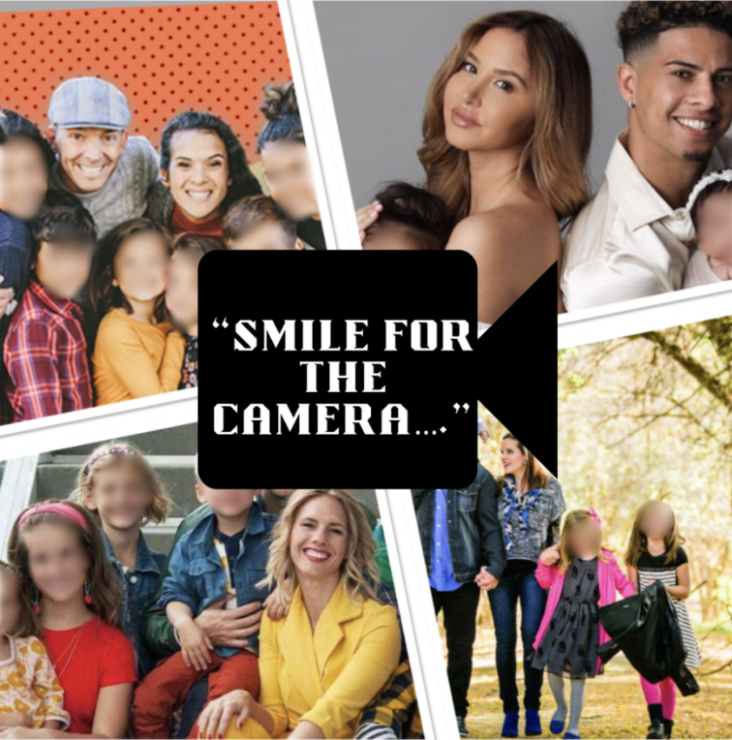Exploitation, humiliation, and abuse on YouTube

Photo collage by Chloe Latour.
CW: This article discusses child abuse and exploitation.
Imagine every minute of your childhood being filmed, edited, and put on the internet for the world to see. Each part of your day is scheduled by your mom, who’s also your boss, and every activity is planned and perfected for the entertainment of millions of viewers. This practice traumatizes children in thousands of vlogs that are uploaded to YouTube daily, and has the potential to influence millions more who watch this content.
Family vlogging is more than recording one’s child and putting the video on the internet. It’s the purposeful practice of exploiting one’s child for financial reward. These videos include daily activities that most parents would never think to record or monetize, like tutoring sessions, dance classes, and piano lessons. Others involve discussions of behaviour issues and disciplinary measures, something that the average parent would consider deeply private.
Not only do these channels see profit from advertisements on their videos, but many also sell themed merchandise and promote adjacent business ventures, like online courses, to reap as much financial gain from their children as they can. This creates a slippery slope where parents become reliant on their children for their livelihoods, and these kids turn into the primary earners of the household.
This fall, Ruby Franke, the mother and creator of 8 Passengers (a family channel with over two million subscribers before being deleted), was arrested for alleged child abuse. She had been a controversial figure on YouTube for some time, with her strict parenting style and disregard for her childrens’ privacy raising concerns for the safety of her family. Initially, audiences began to worry when one of Franke’s children revealed that he had been forced to live without a bedroom for months. Franke also received backlash when she refused to bring her kindergartener lunch at school after it had been forgotten at home. Legal action was only taken when one of her children, malnourished and injured, escaped to a neighbour’s house.
I find it horrific that, unable to help and unaware of the situation’s severity, viewers watched for nearly a decade while Franke caused irreparable trauma to her children. I can only imagine that the financial and personal high of running a family channel contributed to Franke’s twisted psyche and led her down a criminal path.
In the age of family vlogging, it seems that everyone has forgotten why child actors are so carefully protected by law. In the United States, stars like Shirley Temple and Drew Barrymore suffered tremendously at the hands of their parents and agents, and because of this, detailed laws were put in place to dictate measures like restricted working hours and mandatory tutoring. There are also specific rules about where the child’s income is directed so that the actor can keep it as their own.
Not only are today’s child actors well-regulated, but they’re also acting. They’re playing a role written by someone else, not their parent, and that role has nothing to do with their own lives. This degree of separation allows children to maintain some level of privacy, despite their fame. In a vlog, the child is ‘playing’ themself. They might be told what to say by their parents, but this only heightens confusion and creates a wickedly uncomfortable family dynamic. How do they know if Mom is really proud of their report card if she’s saying it while the camera is rolling? And how do they separate their real identity from the one that their parents want them to portray for views?
The next few years will be a pivotal time in the world of family vloggers, as some of the very first vlog-famous children reach adulthood and can speak about their experiences behind the camera. I can only imagine the horror of trying to lead a teenage life knowing that anyone and everyone can access the videos of me being potty trained or going to my first school dance.
Family vlogging isn’t only dangerous for the children that it exploits. It’s no surprise to anyone who’s tried watching a family channel video on YouTube that their audience is mostly children. With their sparkling white mansions and elaborate vacations, these parents set a scene for the children watching that depicts love and family as undeniably connected to wealth and privilege. This content solidifies the nuclear household as the standard, creating difficult expectations for impressionable viewers.
Many of these channels push harmful worldviews onto their young fans. In a video from 2022 titled “Abortion. (documentary),” the LaBrant family, a fiercely evangelical family vlog channel with over 13 million subscribers, compares abortion in the United States to the death tolls of the Rwandan genocide, the Cambodian genocide, and the Holocaust. With comments on this video turned off, the family leaves children to watch the “documentary,” believing that it is just as credible as one they might be shown at school.
Until there is proper regulation for the children forced to be front and centre in these videos and protection for their equally as vulnerable audiences, we are forced to sit back while the practice continues. Millions more dollars will be made in the next decade from the complex, massive, and inherently exploitative web that is family vlogging.







